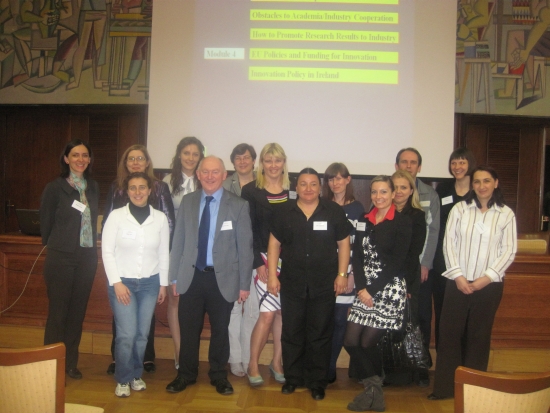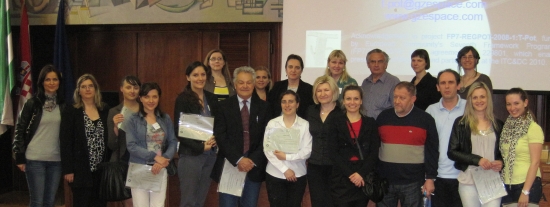 |
 |
 |
 |
 |
| University of Zagreb | Faculty of Textile Technology | 7th Framework Programme | FP7-REGPOT-2008-1:T-Pot | Croatian Chamber of Trades and Crafts |
University of Zagreb, Faculty of Textile Technology (TTF) has organized the Workshop Innovation management, in cooperation with Croatian Chamber of Trades and Crafts (HOK). The workshop was held at the premises of HOK in duration of three days, from 9th till 11th May 2011. It was funded by the F7-REGPOT-2008-1-229801 Unlocking the Croatian Textile Research Potentials (T-Pot) project.
The aim of the workshop was to present the importance of innovation management to the wider audience, both from the academy and entrepreneurship. Important topics presented at the workshop were identification of innovative potential, its measurement, IPR protection and exploitation of the knowledge itself or of developed products/services.
The workshop Innovation management emphasise management of innovation, so as the improvement of management strategy, innovation organisation and culture, innovation life cycle management, inparticular within the small and medium enterprises (SMEs). Management is by the definition continuous development and exploitation of new ideas, products or services in the organization with the general aim of competitiveness increase.
At the first day of the workshop, two IPA projects, with the topic of technology mapping, were presented. The first one presented is coordinated by the University of Zagreb, while the second one is coordinated by The Rudjer Boskovic Institute.
Director of Rudjer Innovations, the spin-off company of The RBI, presented technology transfer and their ways of the R&D commercialisation.
Representative of The Executive Agency for Higher Education, Research, Development & Innovation (UEFISCDI) presented technology Foresight on the example of Romania, while the representative of Saxony Textile Research Institute (STFI) presented the ways of their technology transfer and exploitation of the R&D results, so as its impact on the wider region.
Second day of the workshop was dedicated to the linkages between science and innovations. The key lecturer was Sean Mc Carthy, one of the leading experts in organisation of trainings, dedicated primarily to science managers. He has presented EU innovation strategy, the importance of innovations, so as the obstacles in cooperation between the academy and industry.
Representative of Spanish research centre Leitat presented the advantages of portfolio management, so as of the business case models.
The last day of the workshop was dedicated specifically to entrepreneurship where the past president of the European Association of Research Managers and Administrators (EARMA), Mr. Warden presented the intangible assets and the importance to value, manage, develop and communicate the Intellectual Capital.
Central part of the workshop was presentation of the methodology of innovation potential measurement, developed within the EU funded IMP3rove project. This methodology is supported by the DG Enterprise and Industry of the European Commission and successfully applied on the 2000 European companies, by now.
By the application of this methodology, with the help of licensed experts, the Croatian companies can identified their opportunities and advantages. Furthermore, based on the specific proposed measurements they can develop and improve their innovation management. This model was presented on the case study of textile firm HEMCO from Đakovo, with the excellent innovation results. At the end of the workshop, the successful model of innovations application for the development of new higher added value products was presented by the representative of small Italian company Grado Zero Espace (GZE).
Conclusions of the workshop Innovation Management
1. Innovation Management
1.1. Technology mapping is recognized as the first important step for innovation management
- Two separate IPA projects are running at the same time: one covering the University of Zagreb and other one covering Rudjer Boskovic Institute & University of Rijeka.
- Suggestions were made to combine the efforts in one joint national database for further exploitation. The database is consisting of expertise of individual researchers, expertise of Departments or Laboratories and research infrastructure.
1.2. Correct IPR handling and protection of R&D results is a necessity for successful exploitation
1.3. Technology transfer proved to be very decisive to bridge the gap between the research and industry
- Industrial representatives are advised to use more the service of technology transfer experts who are becoming “Boundary Spanners” between academic and industry.
- Spin-off companies can be a good way to commercialize R&D for the benefit of both parties involved (researchers and SMEs).
1.4. Foresight is offering excellent possibilities of developing action plans to implement long term goals.
- Advice from the European countries lecturers is to use the positive experience of Finland, a country that invests most in science, but also the negative experiences of Ireland, on the way to the EU.
- Foresight Technology is one of the tools that can help and the foresight experts recommendation is to use this technology to improve the competitiveness of Croatian companies.
2. Science and Innovations
2.1. Vision is a key parameter.
- It is important to have a common vision followed by the strategy development and its implemenatation by an stakeholders.
2.2. It is extremely important to have access to the information, watch major trends and get a bigger picture.
2.3. We need more systematic approach at the national level. We have to be focused on the broad picture not the narrow interest (Ministry, Faculty).
2.4. The future of EU SMEs is to find a niche within a niche. The ability to develop new technology platform is essential.
3. Entrepreneurship and Innovation
3.1. It is not enough to work on the daily basis, it is necessary to think in advance.
(EU model of Intelectual Capital) – Phrase: Solving tomorrows problems while keeping your feet on the ground.
If we knew our problems in advance we will be better prepared to tackle and solve them.
3.2. The culture of working together, respecting one anothers views and values in a context of trust is a necessity.
3.3. IMP3rove methodology is pointing the key strengths and weaknesses of the innovative SMEs.

Fig. 1. T-Pot team with Sean McCarthy – one of the presenters
at the workshop Innovation Management

Fig. 2. T-Pot team and TTF participants of the workshop
after lecture of Elene Turco, Ph.D.
|
Dr. Sandra Bischof Vukušić, Prof. |
|

